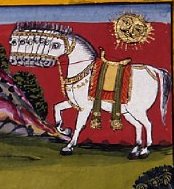Uchchaihshravas
Uchchaihshravas is a mythical creature found in Hindu mythology, renowned for being the king of horses. According to ancient texts, this magnificent steed emerged during the Samudra Manthan or the churning of the ocean of milk, a pivotal event in Hindu tradition that involved both the gods (Devas) and demons (Asuras) in a collaborative effort to obtain Amrita, the nectar of immortality. Uchchaihshravas is often described as a white horse with seven heads, embodying purity and exceptional strength, and is considered to be the best of horses, often associated with the Hindu god Indra, the king of gods and the heavens.
Mythology[edit | edit source]
The legend of Uchchaihshravas is deeply embedded in various ancient Hindu scriptures, including the Mahabharata, Puranas, and Vedas. During the Samudra Manthan, numerous divine objects and beings emerged from the ocean, including the goddess Lakshmi, the moon (Chandra), the lethal poison Halāhala, and the celestial elephant Airavata. Uchchaihshravas was claimed by Indra as his mount, symbolizing his authority and power among the gods.
Symbolism[edit | edit source]
Uchchaihshravas symbolizes not only power and glory but also the mind's ability to transcend ordinary existence and reach higher states of consciousness. The horse's seven heads are said to represent the seven colors of the rainbow or the seven chakras in the human body, indicating a connection between the physical and spiritual realms.
In Art and Culture[edit | edit source]
Uchchaihshravas has been depicted in various forms of Hindu art and literature, often shown as a radiant white horse flying across the sky or standing majestically. It is a popular motif in temple carvings, paintings, and sculptures, reflecting its importance in Hindu culture and mythology.
See Also[edit | edit source]
Search WikiMD
Ad.Tired of being Overweight? Try W8MD's physician weight loss program.
Semaglutide (Ozempic / Wegovy and Tirzepatide (Mounjaro / Zepbound) available.
Advertise on WikiMD
|
WikiMD's Wellness Encyclopedia |
| Let Food Be Thy Medicine Medicine Thy Food - Hippocrates |
Translate this page: - East Asian
中文,
日本,
한국어,
South Asian
हिन्दी,
தமிழ்,
తెలుగు,
Urdu,
ಕನ್ನಡ,
Southeast Asian
Indonesian,
Vietnamese,
Thai,
မြန်မာဘာသာ,
বাংলা
European
español,
Deutsch,
français,
Greek,
português do Brasil,
polski,
română,
русский,
Nederlands,
norsk,
svenska,
suomi,
Italian
Middle Eastern & African
عربى,
Turkish,
Persian,
Hebrew,
Afrikaans,
isiZulu,
Kiswahili,
Other
Bulgarian,
Hungarian,
Czech,
Swedish,
മലയാളം,
मराठी,
ਪੰਜਾਬੀ,
ગુજરાતી,
Portuguese,
Ukrainian
Medical Disclaimer: WikiMD is not a substitute for professional medical advice. The information on WikiMD is provided as an information resource only, may be incorrect, outdated or misleading, and is not to be used or relied on for any diagnostic or treatment purposes. Please consult your health care provider before making any healthcare decisions or for guidance about a specific medical condition. WikiMD expressly disclaims responsibility, and shall have no liability, for any damages, loss, injury, or liability whatsoever suffered as a result of your reliance on the information contained in this site. By visiting this site you agree to the foregoing terms and conditions, which may from time to time be changed or supplemented by WikiMD. If you do not agree to the foregoing terms and conditions, you should not enter or use this site. See full disclaimer.
Credits:Most images are courtesy of Wikimedia commons, and templates, categories Wikipedia, licensed under CC BY SA or similar.
Contributors: Prab R. Tumpati, MD

